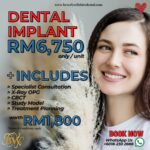
Wisdom Teeth Extraction
Our body changes from head to toe over time. So do our mouth and oral conditions. As an obvious and sometimes painful dental milestone, here come our wisdom teeth when we are between 17-25 years of age.
What are wisdom teeth?
Do we get any wiser with the emergence of wisdom teeth? Unfortunately, we don’t. Wisdom teeth or third molars are the last teeth to erupt into the mouth. Third molars have been named wisdom teeth only because they appear at a later stage of our life.
There are two wisdom teeth in one jaw: one on the left side and the other one on the right side of the jaw. Altogether there are four third molars in both the upper and lower jaw.
Since the biting surface of the molar teeth is relatively larger compared to other types of teeth, they increase the biting and chewing efficiency thereby helping for better digestion.
Why do wisdom teeth get impacted?
Do you know that every species in the world is undergoing evolution even in this very second? Evolution is strange but smart since it gradually removes the parts that we no longer use from our bodies. Ages ago, human beings had rough food habits in which they ate raw meat most of the time. They needed strong teeth with a high surface area to bite and chew on them. So, wisdom teeth were exceptionally helpful for the survival of our ancestors. However, with the advancement of the modern world, even food habits have changed into softer dietary practices.
Therefore, the necessity of wisdom teeth is gradually drifting away, and evolution is trying to remove the traces of third molars from our mouths forever. While a smaller number of people even don’t know when or how their third molars came into the mouth most of us have to suffer through the process.
Thus, one or two or even all four wisdom teeth are missing in children in the 21st century. In others, they get impacted due to,
- Small jaws: there’s not enough space for the wisdom teeth to erupt
- Erupting to the wrong position: sometimes the eruption pathway of the teeth tends to change, and they try to emerge through the wrong position making them impacted.
Why is the appearance of wisdom teeth painful?
When either the space available for the eruption of the wisdom teeth is not enough, or when the third molars erupt into the wrong position pushing the adjacent teeth a high pressure builds up within the jawbone and the gums. This inner pressure building up around the impacted tooth will compress the nerves and sensitize them causing severe pain in the back of the jaw.
How do I know whether I have impacted wisdom teeth?
You might be curious whether you or your child has silent impacted teeth in the mouth. While some impacted wisdom teeth are innocent and do nothing disturbing, the ones which try to erupt will give you some hard time. If you are experiencing one or a few of the following symptoms you might have impacted molars in your mouth.
- Constant throbbing pain in the back of your mouth: since the third molars are located at the most back of your jaws, you may experience a severe constant throbbing pain in the back of your mouth without any obvious reason such as tooth decay or fracture.
- Changes in the gums in the back of your mouth: the effort to erupt the mouth will lacerate the above and surrounding soft and hard tissues making the gums reddish, swollen, and bleeding.
- Swelling in the back of the face: continuous pressure maygive rise to swelling in the face in relation to the molar region. You will notice a little facial asymmetry and sometimes the swelling may be tender to touch.
- Tender lymph nodes: tender lymph nodes are one of the signs that an infection. if the tooth gets infected due to bacterial activity around the tooth, the lymph nodes under the lower border of the lower jaw will be palpable and painful to touch.
- Bad smell and bad taste: the bacteria and their byproducts will give rise to smell and taste disturbances.
- Difficulty in opening the mouth:if an impacted wisdom tooth is kept untreated the infection and subsequent swelling will progress making it difficult to open your mouth.
How do I confirm whether I have impacted wisdom teeth without noticeable symptoms?
You can confirm whether your wisdom teeth are fully erupted or impacted when you visit your dentist. If you are someone between 17-25 years and if you are concerned, you can ask your dentist for confirmation. He will examine you thoroughly and may order an X-ray of your mouth, and an OPG to check the condition of the wisdom teeth.
An OPG is a type of X-ray which shows your complete mouth and by looking at the X-ray, a dentist can tell you,
- Whether you have wisdom teeth or not
- When are they going to erupt?
- Will they be problematic?
- Should they be removed or kept under observation?
- If they ought to be removed what will be the treatment plan?
Is it necessary to extract wisdom teeth?
No, not always. If your wisdom teeth are erupting in the proper place and are not problematic due to impaction they can be kept as it is. When the future of the teeth is not clear, your dentist may recommend keeping the teeth under observation.
In simple words, the wisdom teeth should be removed only when they are not innocent and keep disturbing you.
What are the Types of Wisdom Tooth Impaction?
The type of wisdom teeth impaction will determine the complexity of the impaction and the extraction procedure. There are four types of wisdom teeth impaction.
- Mesial
- Distal
- Vertical
- Horizontal
Sometimes vertically or distally impacted teeth need not be removed. If they are indicated for removal it will be easier to remove them than the horizontally or mesially impacted teeth because they might damage the adjacent front tooth. However, only an experienced dentist can decide on the best way to remove the tooth according to the type of impaction.
Do I need to replace Wisdom Tooth after removal is done?
Not necessarily. Wisdom teeth are the most back teeth in the arch. Thus wisdom teeth are not essential to maintain either aesthetics or functional efficiency, there’s no need to replace wisdom teeth. Rarely, your dentist may suggest replacing the tooth If there’s a risk of the opposing tooth over erupting in the absence of the wisdom tooth.
What happens during the wisdom teeth extraction?
- First, your dentist will do a thorough examination of your mouth to come up with the best treatment plan suited for your condition.
- Then the doctor will give you an anaesthetic injection to numb the area so that you will not feel any pain or discomfort during the procedure.
- If it seems not complex, the tooth will be extracted in the dental chair itself as any other normal tooth removal.
- If there is not enough room in the mouth for the removal of the tooth chair-side, a simple surgery will be carried out in a separate minor oral surgery unit. You might need a simple incision.
- After incising the overlying gum, the dental surgeon may take the tooth out in whole, or he may section the tooth into pieces and will take them out gradually piece by piece. Sectioning of the tooth will ensure minimal damage to the adjacent teeth and the soft tissues.
- The dentist may then suture the area to secure the wound to ensure complete and fast healing of the wound.
- Sometimes, when more than one nuisance wisdom tooth should be removed at once, you may have to undergo a more complex surgery in the operating theatre under general anaesthesia where the surgery team will anaesthetize your whole body for a few hours.
What are the DOs and NOT DOs after the extraction of teeth?
If the removal was a minor surgery, you can go home on the same day after the procedure.
For better and fast healing of the surgical site, you need to protect the blood clot that’s formed after the removal of the tooth. For that, you need to follow a few simple things after the extraction of any tooth including a wisdom tooth.
Within the next half an hour,
Bite on the cotton pellet(gauze) to control the bleeding and remove it after 30 minutes. If the bleeding persists you can bite on another cotton pellet for another 30 minutes. If the bleeding doesn’t stop, you should visit your dentist as soon as possible so that he can do the necessary management to control it.
Within the next 24 hours,
- Avoid spitting out after the extraction in the next 24 hours. Yes, to avoid the removal of the blood clot due to pressure, you may have to swallow everything in the mouth.
- Don’t brush your teeth until the next day.
- Make sure to brush the surgical site gently on the following day.
On the day of extraction,
- Don’t consume hot food or beverages because it can dissolve the blood clot.
- Try to help yourself with mild cold food and beverages.
- Don’t use straws as they can dislodge the clot due to the negative pressure built up in the mouth.
- Never try to touch the surgical site with your tongue, safety pins, or fingers.
- Take the pain and anti-inflammatory medications as recommended by your dentist.
- Never stop taking the antibiotics in the middle of the course even if you feel better because it’s essential to take the antibiotics for the recommended duration to avoid any post-surgical infection.
After that, you can follow your normal daily routine but make sure to keep an eye on the site for any changes. If you notice something unusual in relation to the wound, take promptly consult with your dentist.
However, if you had to undergo a surgery or the removal of more than one tooth at once you will be admitted to the hospital and you will be taken care of in the ward for 3-5 days. Your food choices may be limited in the meantime. Even after the hospital care, you need to take good care of the wounds to let them heal fast and properly.
How should I prepare myself before the extraction of a wisdom tooth?
Before the extraction of any tooth, it’s better if you could follow these simple steps.
- Always make sure to inform the dental team about your past medical history and drug history. They may have to get approval from your medical team before the intervention especially if you are under warfarin.
- You should be extra careful if you are pregnant and make sure to inform in which trimester you are.
- Certain drugs are not suitable if you are a breastfeeding mother. So, inform them beforehand.
- It’s better if you can have a morning appointment if you are diabetic.
- If you were not advised to stop or change the dose of some medications, take them as usual before the extraction.
- Eat a healthy diet before the appointment.
- Take someone to be with you if you are phobic about the dental procedures.
- Try to avoid driving back by yourself if possible.
What happens if I don’t remove the wisdom teeth?
No artificial tooth indeed feels or serves you as natural teeth. Therefore, dentists don’t encourage the extraction of natural teeth unnecessarily. However, if they are going to be problematic it’s better to get rid of them as early as possible. Here’s what happens if you decide not to remove the impacted wisdom teeth.
- Unbearable pain: soon impacted teeth will be a burden because the developing pressure inside will make it intolerably painful.
- Tooth decay of the adjacent teeth: impacted wisdom teeth will constantly be disturbing the nearby teeth leaving them at risk of developing tooth decay.
- Repeated infections: in case the impacted teeth are attacked by harmful bacteria, they will get infected repeatedly until we remove them.
- Swelling: infection causes the tissues to swell and become painful.
- Life-threatening condition: if the bacteria enter the bloodstream and travel to the vital organs, you may face some serious conditions like septicemia, infective endocarditis, and stroke.
Therefore, it’s better to extract the impacted wisdom teeth if your dentist recommends doing so.
How can you prevent wisdom teeth impaction?
Unfortunately, you can’t. However, if you can maintain your dental hygiene to the maximum, you can reduce the consequences. Just make sure to,
- Brush your teeth twice daily, especially at night before bed.
- Floss once a day to remove the hidden plaque and calculi in between your teeth.
- Eat less amount of sugar throughout the day to reduce the risk of getting dental caries.
- Having a healthy diet rich in fresh fruits and vegetables every day.
- Visit your dentist every six months so that you can identify the impacted teeth early, long before they start hurting you.
How much does it cost to have a Wisdom Tooth Extracted?
Like any other treatment, the cost of a wisdom tooth removal depends on the,
- Type of impaction
- The complexity of the treatment
- The severity and the extent of the infection if present any
- One clinic to another
- Dentist qualifications
- Treatment protocols
Generally, it may cost anywhere between RM600 to RM2,500 per tooth, in Kuala Lumpur, Malaysia.





